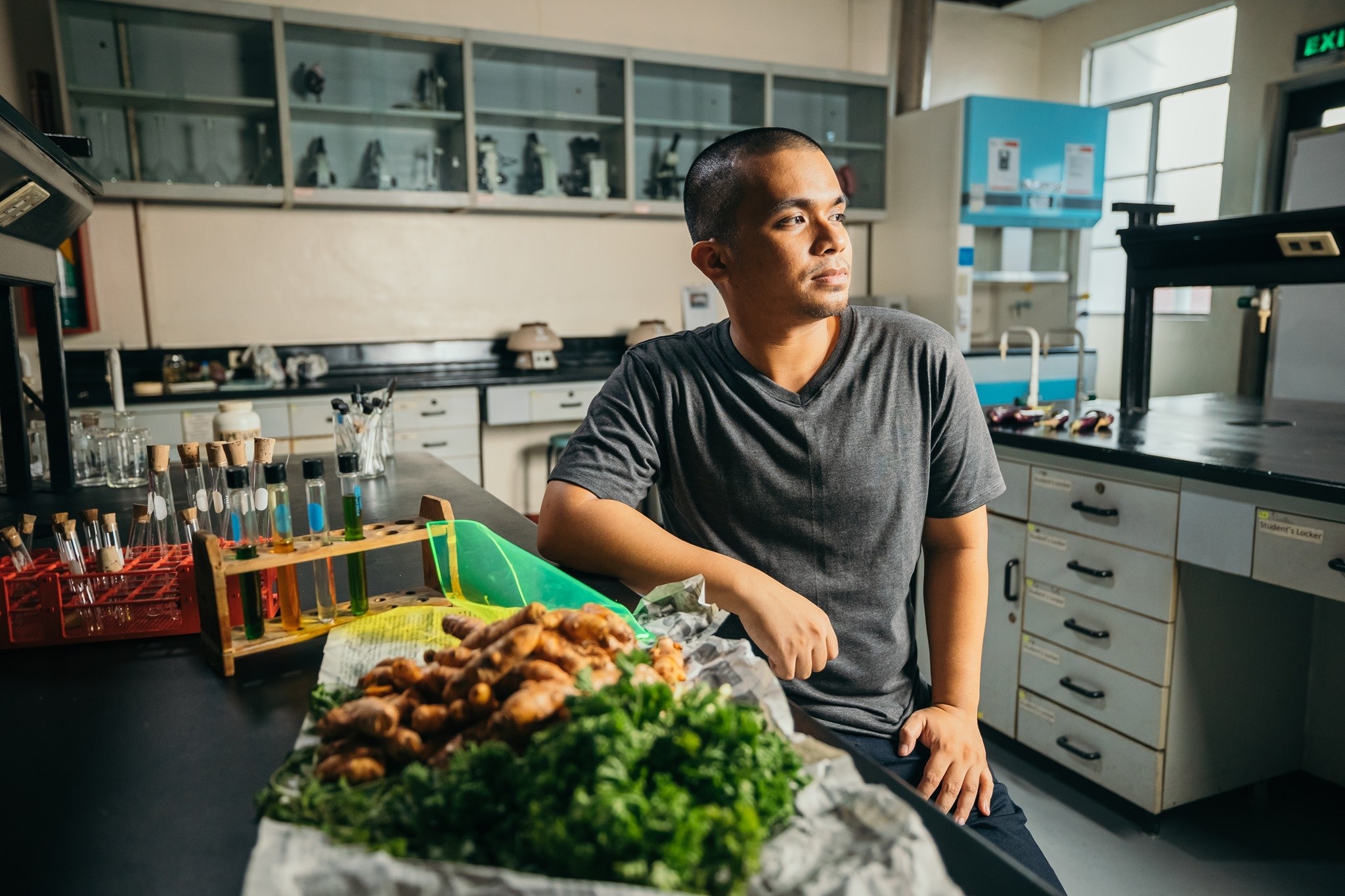Scientists Made a Solar Panel From Recycled Food Waste That Can Generate Electricity Without Sunlight

Every year, over 1.3 billion tons of food goes to waste—fruits and vegetables left to rot while millions struggle with hunger. At the same time, the world is in a desperate search for cleaner, more sustainable energy. But what if these two crises—food waste and energy shortages—weren’t separate problems? What if they were part of the same solution?
That’s exactly what a young innovator in the Philippines discovered. Using discarded food scraps, he developed a solar panel that generates electricity even without direct sunlight.
This breakthrough, called the Aureus Solar Panel, doesn’t just rely on visible light like traditional solar panels—it taps into ultraviolet (UV) rays, which are present even on cloudy days and at night. Imagine a world where banana peels and wilted lettuce don’t end up in landfills but instead help power homes, hospitals, and entire cities.
A Panel That Works Without Direct Sunlight
For decades, solar energy had one major limitation—it depended on direct sunlight. On cloudy days, during storms, or at night, traditional solar panels became unreliable or stopped working altogether. This made renewable energy adoption a challenge in many parts of the world.
That’s the problem Filipino engineering student Carvey Ehren Maigue set out to solve. His invention, the Aureus Solar Panel, captures ultraviolet (UV) light and converts it into electricity, regardless of weather conditions. This breakthrough earned him the prestigious James Dyson Sustainability Award, highlighting its potential to transform the way we harness clean energy.
At the core of this innovation is something unexpected: food waste. Fruits and vegetables contain organic compounds that naturally absorb UV radiation. Maigue discovered that by extracting these luminescent particles from discarded food and embedding them in a transparent resin panel, he could create a system that converts UV rays into visible light. This light is then captured by standard solar cells, generating electricity even when the sky is overcast.
Unlike traditional solar panels, which struggle in low-light conditions, the Aureus system thrives in places where UV rays are present but often overlooked. This means more consistent energy production, regardless of cloud cover or the time of day.
But its impact goes beyond just efficiency. The Aureus Solar Panel introduces a way to repurpose food waste—one of the world’s biggest environmental challenges—into a source of renewable energy. Instead of letting organic waste decay and contribute to greenhouse gas emissions, this technology transforms discarded produce into something powerful: clean, sustainable electricity.
Turning Food Waste Into Clean Energy
 Image source: The James Dyson Award Organization Website
Image source: The James Dyson Award Organization Website
The science behind the Aureus Solar Panel is both simple and revolutionary. Unlike traditional solar panels that rely on visible sunlight, Aureus panels harness ultraviolet (UV) light, an abundant yet often overlooked energy source. Since UV rays can penetrate through clouds, they remain available even on overcast days and at night.
The key to capturing this energy lies in a unique process. Organic luminescent compounds extracted from food waste absorb UV rays and re-emit them as visible light. This re-emitted light is then captured by standard solar cells, which convert it into electricity. The result is a solar panel that isn’t restricted by weather conditions, making it far more reliable than conventional photovoltaic systems.
The process starts with collecting discarded fruits and vegetables, particularly those rich in luminescent compounds. These compounds are extracted and suspended in a transparent resin, forming a flexible and lightweight panel. Unlike bulky silicon-based panels, Aureus panels can be installed on windows, walls, and even building facades, allowing urban areas to generate power without requiring additional space.
Another key advantage is sustainability. Conventional solar panels require energy-intensive production methods that rely on mined materials, but Aureus panels use biodegradable organic compounds. This makes them not only a cleaner alternative but also a step toward a truly circular energy system—one that reduces waste while creating power.
Because Aureus panels function with ambient UV light, they don’t need direct sun exposure, making them ideal for high-rise buildings, densely populated cities, and regions with unpredictable weather. This flexibility could redefine how we integrate renewable energy into everyday life, making it accessible in places where traditional solar panels have struggled.
Rethinking Waste: The Future of Energy Lies in What We Throw Away
 Image source: Pexels
Image source: Pexels
What if the key to solving our energy crisis isn’t just about capturing more sunlight, but about rethinking what we consider waste? For years, solar technology has focused on improving efficiency, reducing costs, and expanding access. But the Aureus Solar Panel challenges a deeper assumption: that only high-tech materials can power the future.
By proving that discarded fruits and vegetables can be repurposed into functional solar panels, this innovation pushes the boundaries of what’s possible. It suggests that solutions to some of our biggest environmental challenges aren’t in futuristic labs—they’re in the things we throw away every day.
This shift in perspective forces us to reconsider how many overlooked resources could be transformed into sustainable energy sources. We’ve spent decades refining silicon-based solar panels, yet nature has been offering alternative solutions all along. The ability to generate electricity from food waste means we’re not just talking about clean energy—we’re talking about a circular system, where waste is no longer a problem but an opportunity.
Bringing this kind of innovation into everyday life will take time, but every major breakthrough starts with a bold idea. Right now, the Aureus Solar Panel is still in its early stages, but as more people recognize its potential, industries and policymakers will have to take notice. The real challenge isn’t in the science—it’s in changing how we think.
Innovation Starts With Perspective
 Image source: Pexels
Image source: Pexels
The Aureus Solar Panel isn’t just a breakthrough in renewable energy—it’s a reminder of how much potential we overlook every day. Not just in technology, but in our own lives.
Think about it. How often do we dismiss something—or even someone—because they don’t seem valuable at first glance? How many ideas go untested, how many dreams are abandoned, just because they don’t fit the way things have always been done?
This innovation proves that solutions don’t always require new resources. Sometimes, they require a new way of seeing. Food waste, something the world throws away in billions of tons, just became a source of power. So what else are we underestimating? What problems could we solve if we looked at challenges with fresh eyes?
Maybe the real breakthroughs—the ones that change the world—don’t start with what we have. Maybe they start with what we’re willing to see differently.
Seeing Potential Where Others See Waste
The Aureus Solar Panel is more than just an invention—it’s a shift in thinking. It proves that sustainability isn’t always about building more, but about using what we already have in smarter ways.
For years, we’ve focused on refining traditional solar technology, but this breakthrough reminds us that nature itself offers solutions. By turning food waste into energy, it challenges us to rethink what we consider valuable.
The real power of this innovation isn’t just in generating electricity—it’s in changing our mindset. If banana peels and vegetable scraps can light up homes, what else have we been overlooking? How many other untapped resources could hold the answers to our biggest environmental challenges?
Technology alone won’t save us—curiosity, creativity, and a willingness to challenge old assumptions will. The Aureus Solar Panel is just one example of how a new way of thinking can lead to solutions hiding in plain sight. Because sometimes, the future isn’t about discovering something new—it’s about seeing what was there all along.
Featured Image Source: Carvey Ehren Maigue on Facebook
Loading...






